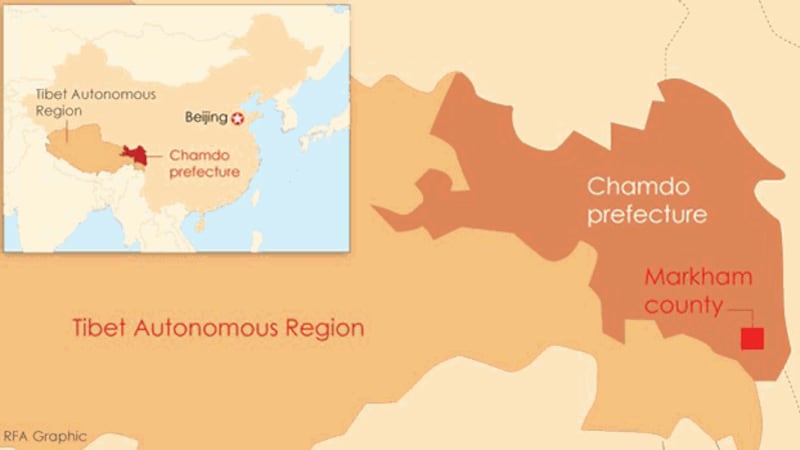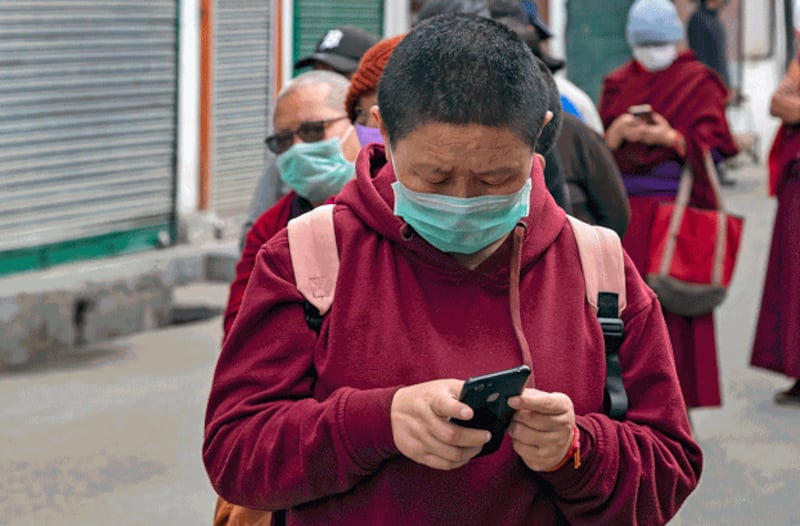Like most Tibetans who live in exile in neighboring India, Kelsang Gyatso had long relied on free social media chat apps to talk to his family members back home in Markham county in the Tibet Autonomous Region (TAR).
But that changed last year when the Chinese government stepped up its surveillance measures and restricted online communications between Tibetans and their family members and friends abroad.
“I was able to communicate with my family and relatives back in Tibet using social media chat apps, [but] the communication was completely cut off a few months back due to greater surveillance and restrictions,” Gyatso told RFA.
Part of Chamdo prefecture, Markham county (in Chinese, Mangkang) is an area rich in agricultural, water and mineral resources. Residents of depend on farming and animal husbandry to make a living.
“It’s very worrisome not having any information on how they are doing, and I’m sure it’s the same for them also not knowing about my well-being,” said Gyatso, who in 2000 fled his impoverished hometown, located in the TAR’s far west and bordering China’s Sichuan and Yunnan provinces.
Chinese authorities in the TAR and Tibetan areas of nearby Chinese provinces restrict freedoms of religion, expression, movement, and assembly, and ignore residents’ concerns about mining and land grabs by local officials, who routinely rely on force to subdue those who complain or protest, human rights groups say.
Authorities have intensified surveillance of Tibetans over the past decade under the leadership of Chen Quanguo, the TAR Communist Party chief from 2011-16 and the figure widely associated with setting up a system of mass internment camps for Muslim Uyghurs in Xinjiang, a restive region north of Tibet, where he led the party from 2016 until last year.
"Chen's system combines hyper-securitization and militarization with efforts to accelerate the political and cultural transformation of local people. Its stated aim is 'breaking lineage, breaking roots, breaking connections, and breaking origins' of Tibetans and Uyghurs," said the International Campaign for Tibet in a December 2018 report.
“Surveillance technologies that have sparked outrage internationally because of their use in Xinjiang were trialed in Tibet,” the Washington-based rights group said.
Tibet, a formerly independent Himalayan country, was invaded by China in 1950 and has been governed by China’s ruling Communist Party ever since. There are some 6.3 million Tibetans living in China and as many as 200,000 living in India, Nepal and Bhutan.

Harassment and punishment
Human Rights Watch's latest World Report, an annual review of human rights practices and trends around the globe, noted that an announcement in November 2020 that the government was tightening controls on online communications it claimed undermined national unity was followed by an uptick in reported detentions of Tibetans in 2021 for alleged online offenses.
"Tibetans who contacted people outside China were harassed and punished, regardless of the content of their communications," said the report by the New York-based rights group.
The authorities’ increasingly hardline policies have made it more difficult for Tibetans in exile to communicate with their families and friends back home, said Tibetan sources inside and outside the region.
RFA’s Tibetan Service recently surveyed 215 Tibetans living in India about the communication flow between them and their relatives and friends inside the TAR, with half of the respondents saying that there has been a complete breakdown in contact because of stepped-up Chinese restrictions and monitoring of residents in recent years.
Forty-four of the respondents said that maintaining contact with those inside the TAR has become very challenging in the last two years.
Tibetans in India rely mostly on the Chinese instant messaging app WeChat to communicate with their family members in the TAR.
Geshe Lobsang Yeshi, Tibet coordinator at the Kirti Monastery in Dharamsala, India, home of the Tibetan spiritual leader, the Dalai Lama, and the Tibetan government in exile, agreed.
“Nowadays, it’s not only politically sensitive conversations but anything you discuss with Tibetans outside that is regulated,” he said. “For instance, there is a specific office set up in [the TAR’s] Ngaba region that regulates and examines the cell phones of local Tibetans.”
To make matters worse, since June 2020, the Indian government has banned more than 200 Chinese apps, starting with about 59 popular applications in the first round, including WeChat, saying that they pose a threat to national security.
The move has hampered communication between some Tibetans in exile and people in the TAR. RFA’s survey found that only 10 percent of respondents were affected — mostly older Tibetans or those who did not know how to use a virtual private network to skirt Chinese internet censorship and blockages.

Prohibiting money transfers
China has been tracking Tibetans in Tibet communicating with those in exile to shut down the flow of information to the outside world, according to sources inside Tibet who provide information to communities abroad.
The Chinese government also has started prohibiting the transfer of money from Tibetans in the TAR to outside recipients, they said.
RFA reported in October 2020 that a Tibetan herder, Lhamo, and her cousin, businessman Tenzin Tharpa, were detained for sending money to family members and others living in India. Lhamo died after being tortured in Chinese custody, while her cousin was still being held by police.
The survey results indicated that it is even more difficult for Tibetans in exile involved in political campaigns and protests against the Chinese government, dignitaries, and journalists to communicate with their families inside Tibet.
“It is a fact that Chinese authorities specifically harass and surveil family members of Tibetans in exile who are usually actively involved in political campaigns, and journalists,” said a Tibetan journalist living in India who requested anonymity for safety reasons.
“My family members back home were also questioned many times in the past by the Chinese authorities who continue to do so,” he added.
Three survey respondents living in Qinghai province told RFA that they had received calls from Chinese authorities urging them to move to the TAR.
Authorities told them that a new Chinese government policy would allow them to reunite with their families in the TAR and that officials would take care of processing the required documents and provide other necessities, the Tibetans in Qinghai said.
“Lately, I’ve been receiving calls from Chinese officials in Tibet asking me to return home,” said a Tibetan who now lives in India.
The Chinese government also sent officials to his home in Tibet and interrogated his parents, taking photos and recording videos of them, said the man, who declined to give his name for safety reasons.
“It worries me now, and because of the growing scrutiny, I’m scared, too,” he said.
Translated by Tenzin Dickyi for RFA’s Tibetan Service. Written in English by Roseanne Gerin.
